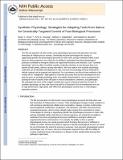| dc.contributor.author | Chow, Brian Yichiun | |
| dc.contributor.author | Chuong, Amy S. | |
| dc.contributor.author | Klapoetke, Nathan Cao | |
| dc.contributor.author | Boyden, Edward Stuart | |
| dc.date.accessioned | 2016-07-07T17:18:16Z | |
| dc.date.available | 2016-07-07T17:18:16Z | |
| dc.date.issued | 2011-05 | |
| dc.identifier.isbn | 9780123850751 | |
| dc.identifier.issn | 00766879 | |
| dc.identifier.uri | http://hdl.handle.net/1721.1/103538 | |
| dc.description.abstract | The life and operation of cells involve many physiological processes that take place over fast timescales of milliseconds to minutes. Genetically encoded technologies for driving or suppressing specific fast physiological processes in intact cells, perhaps embedded within intact tissues in living organisms, are critical for the ability to understand how these physiological processes contribute to emergent cellular and organismal functions and behaviors. Such “synthetic physiology” tools are often incredibly complex molecular machines, in part because they must operate at high speeds, without causing side effects. We here explore how synthetic physiology molecules can be identified and deployed in cells, and how the physiology of these molecules in cellular contexts can be assessed and optimized. For concreteness, we discuss these methods in the context of the “optogenetic” light-gated ion channels and pumps that we have developed over the past few years as synthetic physiology tools and widely disseminated for use in neuroscience for probing the role of specific brain cell types in neural computations, behaviors, and pathologies. We anticipate that some of the insights revealed here may be of general value for the field of synthetic physiology, as they raise issues that will be of importance for the development and use of high-performance, high-speed, side-effect free physiological control tools in heterologous expression systems. | en_US |
| dc.description.sponsorship | National Institutes of Health (U.S.) (NIH Director's New Innovator Award DP2OD002002) | en_US |
| dc.description.sponsorship | National Institutes of Health (U.S.) (NIH grant 1R01DA029639) | en_US |
| dc.description.sponsorship | National Institutes of Health (U.S.) (NIH grant 1RC1MH088182) | en_US |
| dc.description.sponsorship | National Institutes of Health (U.S.) (NIH grant 1RC2DE020919) | en_US |
| dc.description.sponsorship | National Institutes of Health (U.S.) (NIH grant 1R01NS067199) | en_US |
| dc.description.sponsorship | National Institutes of Health (U.S.) (NIH grant 1R43NS070453) | en_US |
| dc.description.sponsorship | National Science Foundation (U.S.) (NSF CAREER Award) | en_US |
| dc.description.sponsorship | National Science Foundation (U.S.) (NSF grant EFRI 0835878) | en_US |
| dc.description.sponsorship | National Science Foundation (U.S.) (NSF Grant DMS 0848804) | en_US |
| dc.description.sponsorship | National Science Foundation (U.S.) (NSF Grant DMS 1042134) | en_US |
| dc.language.iso | en_US | |
| dc.publisher | Elsevier | en_US |
| dc.relation.isversionof | http://dx.doi.org/10.1016/b978-0-12-385075-1.00018-4 | en_US |
| dc.rights | Creative Commons Attribution-NonCommercial-NoDerivs License | en_US |
| dc.rights.uri | http://creativecommons.org/licenses/by-nc-nd/4.0/ | en_US |
| dc.source | PMC | en_US |
| dc.title | Synthetic Physiology: Strategies for Adapting Tools from Nature for Genetically Targeted Control of Fast Biological Processes [Chapter 18] | en_US |
| dc.type | Article | en_US |
| dc.identifier.citation | Chow, Brian Y., Amy S. Chuong, Nathan C. Klapoetke, and Edward S. Boyden. "Synthetic Physiology: Strategies for Adapting Tools from Nature for Genetically Targeted Control of Fast Biological Processes." Methods in Enzymology, Synthetic Biology, Part A., Volume 497, Pages 2-662, (2011). | en_US |
| dc.contributor.department | Massachusetts Institute of Technology. Synthetic Neurobiology Group | en_US |
| dc.contributor.department | Massachusetts Institute of Technology. Department of Biological Engineering | en_US |
| dc.contributor.department | Massachusetts Institute of Technology. Department of Brain and Cognitive Sciences | en_US |
| dc.contributor.department | Massachusetts Institute of Technology. Media Laboratory | en_US |
| dc.contributor.department | McGovern Institute for Brain Research at MIT | en_US |
| dc.contributor.mitauthor | Chow, Brian Yichiun | en_US |
| dc.contributor.mitauthor | Chuong, Amy S. | en_US |
| dc.contributor.mitauthor | Klapoetke, Nathan Cao | en_US |
| dc.contributor.mitauthor | Boyden, Edward Stuart | en_US |
| dc.relation.journal | Synthetic Biology, Part A | en_US |
| dc.eprint.version | Author's final manuscript | en_US |
| dc.type.uri | http://purl.org/eprint/type/JournalArticle | en_US |
| eprint.status | http://purl.org/eprint/status/PeerReviewed | en_US |
| dspace.orderedauthors | Chow, Brian Y.; Chuong, Amy S.; Klapoetke, Nathan C.; Boyden, Edward S. | en_US |
| dspace.embargo.terms | N | en_US |
| dc.identifier.orcid | https://orcid.org/0000-0002-0419-3351 | |
| mit.license | PUBLISHER_CC | en_US |
